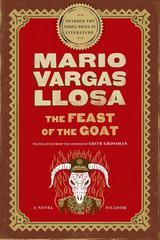 Mario Vargas Llosa, the Peruvian novelist, journalist, essayist, and winner of the Nobel literature prize in 2010, died April 13 at age 89. He wrote in a variety of genres, including historical novels, political novels, comedies, murder mysteries, essays, political essays, literary criticism, and plays. Early work that established his international reputation included the novel The Time of the Hero, set in a Peruvian military school and based on his experiences at a military school; The Green House, set in a brothel of the same name; and Conversation in the Cathedral, which focuses on dictatorship's effect on the country's citizens.
Mario Vargas Llosa, the Peruvian novelist, journalist, essayist, and winner of the Nobel literature prize in 2010, died April 13 at age 89. He wrote in a variety of genres, including historical novels, political novels, comedies, murder mysteries, essays, political essays, literary criticism, and plays. Early work that established his international reputation included the novel The Time of the Hero, set in a Peruvian military school and based on his experiences at a military school; The Green House, set in a brothel of the same name; and Conversation in the Cathedral, which focuses on dictatorship's effect on the country's citizens.
Later work included Aunt Julia and the Scriptwriter, based on his first marriage, which took place when he was 19, to his uncle's sister-in-law, who was 10 years older than Vargas Llosa; The War of the End of the World, about an uprising by a cult in 19th-century Brazil; and The Feast of the Goat, about the assassination of Rafael Trujillo, longtime dictator of the Dominican Republic.
Vargas Llosa "combined gritty realism with playful erotica and depictions of the struggle for individual liberty in Latin America, while also writing essays that made him one of the most influential political commentators in the Spanish-speaking world," the New York Times wrote. He "gained renown as a young writer with slangy, blistering visions of the corruption, moral compromises and cruelty festering in Peru. He joined a cohort of writers like Gabriel García Márquez of Colombia and Julio Cortázar of Argentina, who became famous in the 1960s as members of Latin America's literary 'boom generation.' "
In 2010, the Nobel committee praised Vargas Llosa for "his cartography of structures of power and his trenchant images of the individual's resistance, revolt, and defeat."
Vargas Llosa shifted politically during his life. As a young man, he was a Marxist and supported Cuba, but eventually became what the Wall Street Journal called "an unshakable defender of democracy, personal liberties and free markets at a time when the region was polarized between leftist revolutionaries and right-wing dictatorships. His belief that private enterprise and political freedom were inseparable turned him into an ideological outsider among members of Latin America's intelligentsia."
In 1990, when the country was in economic crisis and Shining Path was strongest, Vargas Llosa ran for president of Peru, but was soundly defeated by Alberto Fujimori.
Besides the Nobel Prize, Vargas Llosa won the Cervantes Prize, the Rómulo Gallegos Prize, the Prince of Asturias Award, the Jerusalem Prize, and the Pablo Neruda Order of Artistic and Cultural Merit. In 2021, he was elected to the Académie Française. In the late 1970s, he was president of PEN International.

